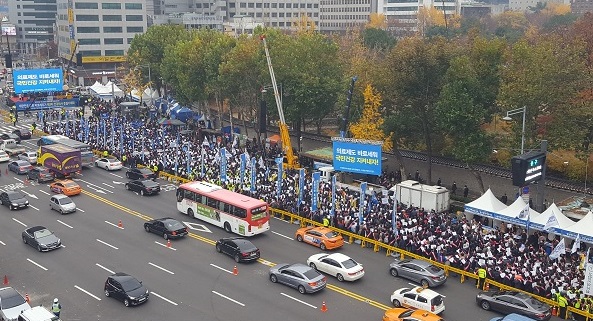More than 7,000 physicians protested on Sunday a court’s sentencing of jail terms on three doctors for misdiagnosing and causing the death of a child. They demanded the government build a safer environment to practice medicine.
The Korea Medical Association held a rally, titled “Setting Right the Korean Healthcare,” in front of the Deoksu Palace, central Seoul.

Doctors criticized the ruling and called it unfair, saying the court did not understand “the characteristics of the medical service that deals with people’s lives.” If the court keeps sentencing prison terms on doctors who misdiagnose, doctors will be reluctant to make a prompt diagnose which will consequently hurt the public health, protesters said.
“Imprisoning a doctor just for having a bad clinical result is like telling us not to see patients at all,” said Lee Cheol-ho, chair of the KMA’s executive board of trustees. “If we can’t get a solution out of this, we will have to give up our medical service, not to go to jail and to survive.”
Kim Dong-seok, president of the Korean Medical Practitioners Association (KMPA), also said no physician would try to provide medical service if doctors are arrested just because of misdiagnosis.
“It distorts the purpose of the medical service and creates conflicts between doctors and patients,” he criticized.
Other physicians, who appeared before the audience taking the “100-second podium,” called for the government to improve healthcare system which was deemed unfair to doctors.
“In the U.S., more than 40,000 people die due to medical errors. If our society responds to arrest a doctor every time a medical mishap occurs, it will cause great confusion among doctors,” said Kim So-yeon, executive director at the Korean Society for Patient Safety. “Now is the time for the government not to arrest medical professionals but to try to make a safe medical environment.”
Bang Sang-hyeok, vice president of the KMA, said many members of the KMA expressed anger because the court did not identify problems of the medical system but only focused on the outcome of misdiagnosis and sentenced jail terms. “What we want from the government is to amend the wrong system to help us provide the best medical care for the public. I wish our rally could deliver our message to the government and the public.”
However, it remains questionable whether the recent KMA’s rally could persuade physicians across the nation to carry an all-out strike.
Before the rally, the KMA held an emergency meeting with 16 city and provincial associations of physicians, the Korean Academy of Medical Sciences, KMPA, and the Korean Intern Resident Association to discuss whether to go on a national strike. However, the medical groups failed to reach a consensus.
Participants of the rally agreed on the necessity of a general strike and let the KMA’s executive boarder decide the timing and the method.
As municipal and provincial associations of doctors and their subgroups opposed to a national strike, the KMA’s executive board led by KMA president Choi Dae-zip will need to derive a consensus out of various opinions from the medical community, observers said.
Jeong Seong-kyun, planning director at the KMA, said the participants of the meeting shared a view that the medical community would need to wield power such as doing a national walkout because doctors questioned whether the government cared about them.
“As situations can change, with the government’s change of stance or KMA members’ will to act together, I can’t confirm whether we will do a national strike,” he said.

